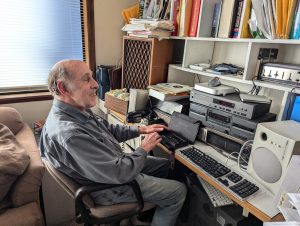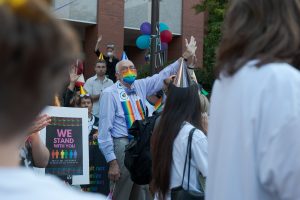Andrew Yang looks forward
Andrew Yang’s keynote address on the future of work and the generation in charge of creating it
October 14, 2020

After a weeklong virtual event, Seattle Pacific University’s 2020 Days of Common Learning came to a conclusion with a keynote address from former presidential candidate, Andrew Yang.
In his address, Yang explained how COVID-19 accelerated the fourth industrial revolution, and students’ roles in the future economy. The address was followed by a discussion session led by two panels: a panel of SPU faculty members and a panel of SPU students.
“I like his ideas, and he’s definitely more on the side that I hope politics goes in America, where it’s more fact based, real, and looking toward the future rather than dwelling on the past,” said second year student panelist Ajay Patel.
Yang believes college students have a distinct advantage over the rest of society in this time of economic change. In comparison to older generations, he said that today’s young adults will have an easier time preparing for and adjusting to the fourth industrial revolution and its effects on the economy.
“We’re lucky that we were born in a time where we’re going to be able to understand this, particularly because our generation is going to be driving it,” Patel said. “Especially coming out of COVID-19; I think times of hardship really accelerate human progression. So, I think COVID-19 is only going to make our generation more resilient. So, now that we’re both more resilient and empathetic I think we’ll be able to shape an economy that will work well for everybody.”
When talking about the COVID-19 pandemic during his speech, Yang described the virus as a catalyst for the fourth industrial revolution. He illustrated that new technology aimed at limiting human contact didn’t just serve to deplete the spread of COVID-19, but also to expedite an automated work-force the U.S. economy was not yet prepared for.
“We’ve seen ten years worth of change in the last ten weeks, and many of these changes are not great for many workers,” said Yang. “We are in the midst of the greatest calamity catastrophe in generations.”
Third-year student panelist Steven Kotansky doesn’t believe that all uses of Artificial Intelligence (AI) are inherently harmful to the working class. Kotansky argued that despite AI inevitably replacing many American jobs, it will also increase efficiency and lower overall costs all while using less human capital.
“I think the idea of having to choose between a ‘humanized economy’ and an ‘AI economy’ is a false dichotomy that our generation ought to reject,” Kotansky said. “Our generation does not have to stand for that. We need to collectively decide to embrace the marvels of AI as a societal victory while demanding the benefits of AI are distributed in a way that ensures both equity and equality.”
While ruminating over the future of the economy, Yang suggests that if AI overtakes lower-level labor, then humans will have more room to let creativity flourish.
“These are non-repetitive, cognitive jobs that center around design, engineering, teamwork, sales, and creativity.” said Yang. “These are roles that you’re going to have a persistent need for, for years and decades to come.”
Yang believes that AI will monopolize the more boring or practical occupations, allowing for the exponential growth of creative jobs pursued by passion.
“When you talk about what this fourth industrial revolution means for humanity, it’s trying to redefine why we do what we do, why we value it, and saying to folks that these things that you enjoy can become the center of a new economy,” said Yang.
Yang said that the market does not reward creativity so the next generation needs to work to change that narrative not just for themselves, but for generations to come.
“Last week, I switched from a business major to an English major because of the exact thing he was talking about,” said first-year Courtney Case. “I always thought it was just a fun hobby, and work had to be miserable, but he’s right. When the robots take over, they can have all the boring jobs and humans can spend more time being creative and having more right-brain-centered jobs.”
Second-year student panelist Karsten Kroening said the ideal future that Yang described would enrich culture by making headway for artists, writers, and philosophers to pave society.

“When you talk about the future of work, in many ways, we have to come together to determine what that future looks like,” said Yang.
Kroening went on to describe Yang as a uniting figure in an economy that depends on the collectivism of its society.
“I think realistically the only way to have control over the economy is to participate in it. Buy from companies you believe are ethical, and boycott ones you find questionable. Also vote and spread the message of the candidates you think will bring the economy in which we thrive,” said Kroening.
Yang referred to his address as a call to action for this generation of students to make the future of work whatever they want it to be. He encouraged them to work together to manifest the future they want to inhabit.
“Although many of us are still just students, we are the leaders of the future,” said Taggart. “We have both the power and the obligation to direct the future, economy, and otherwise, where we want it to go. However, we will only achieve this future together. It’s our responsibility to create the future we want, together.”

























































































